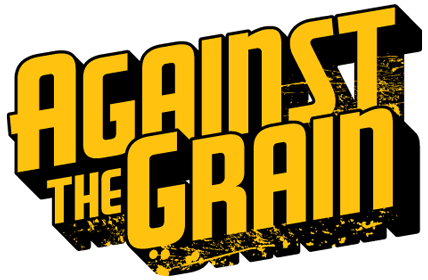![]()
Our 83rd Session is hosted by Rebecca Patrick, who writes online at The Bake and Brew. Her topic for this session is decidedly against the grain, so much so that it is specifically Against the Grain.
How much is our taste or opinion of a craft beer affected by what friends and the craft beer community at large thinks? What beer do you love that no one else seems to get? Or what beer do you say “no thanks” to that everyone can’t get enough of?
I can find myself wondering sometimes when I’ve had an extremely popular beer, but haven’t been all that “wowed”…is it me? Am I missing something here? Was there too much hype? Could there be such a thing as taste inflation? If we really want to dive further into this, is it really only “good” if a large portion of the craft beer community says it is or is our own opinion and taste enough?

You only have to watch the lines at GABF at the beginning of each session to know that hype and brand perception do play a role in a brewery’s success. There are a handful of breweries whose lines are suddenly longer than most of the others, seemingly immediately after the doors open and the people rush inside. Many make a beeline to a select number of brewer’s booths. Many of these remain more crowded throughout the session. Are they better than other breweries? Perhaps, but probably not. They certainly make good beer, and beer which has, for whatever reason, captured the public imagination. That intangible popularity, whether manufactured or developed organically, is at least a part of the company’s success. Any business needs to have customers want to buy their products or they won’t survive. I know that sounds obvious, like the sports announcer who says the team has to score more points in order to win, but I think we sometimes forget that.
Indeed, many people complain mightily about hyped and over-hyped beers, forgetting that hype is the engine that drives awareness and, ultimately, sales. Honestly, if you don’t want to wait in a line all day for some rare (or even artificially rare) beer, I think I see a way out. Don’t go. But what I don’t understand is the need to piss on everybody else’s enjoyment of the event. The many release parties and events that numerous breweries create are generally well-attended, despite the complaining, so what’s the problem? It sometimes feels like we’re entering a phase in craft beer akin to the music world where as soon as a band becomes popular, their fans who were with them in the beginning accuse them of “selling out” or say they’re no good anymore, moving on to the next unknown. It was ridiculous when I was in the music business, and it’s no less absurd when it comes to beer.

But that brings us back to Rebecca’s question about whether or not “our own opinion and taste [is] enough?” Yes. Yes, it is. If you’re a longtime reader of the Bulletin, you’ve probably noticed that I rarely post “reviews” of beers. Unless it’s part of a specific assignment, I generally don’t. I’ve been writing about beer over twenty years, and been judging at competitions for around fifteen years, and been drinking critically far longer than that, and still I don’t really understand why anyone would take my advice on how good a beer is. Whenever anyone writes a review, it’s personal. By design and definition, what I say about a beer is just how it tastes to me — what I like or don’t like about it — on that particular day and under the specific circumstances it was sampled (time and place). But your experience will vary. Your palate isn’t the same as mine. If I’ve learned anything from tasting with the same people for many years (on tasting panels and commercial judging) it’s that tastes vary. Different people have tolerances and sensitivities to certain flavors and those vary from person to person. It’s not a problem in most instances; spaghetti tastes like spaghetti to almost everybody. But when you examine anything more closely, the minute differences become more important when you’re paying close attention and looking for them. With so much variation, you’d think that beer judging would be little better than a crapshoot, and yet many beers that as a community we agree are at least good, tend to rise to the top and win awards multiple times. By careful selection of judges with different backgrounds and experience, and by making the standards for judging as unambiguous and detailed as possible, these differences seem to work themselves out. That’s been my experience, as least.
But having worked retail a lot when I was younger, I’ve also witnessed that many people do honestly want to be told what to try. It’s not necessarily a bad thing. You ask someone who knows more than you for advice about what’s good, what’s worth trying. In theory, they should know more, and in practice that is often the case. At BevMo, though, I can’t tell you how many times I witnessed people walking the wine aisles with a Wine Spectator open to their ratings pages, shopping the scores. That seems less effective, to me because you don’t know how your own palate matches up to the reviewer (or how honest the review was).
One nice thing about beer, at least, is taking a bad recommendation won’t break the bank. If you try a pint or even a six-pack of something you end up not enjoying, you’re not out too much money. You may not take that person’s advice again, especially if happens several times, but that’s about it. If I start doing more reviews, which is always a possibility, my only goal would be to suggest beers to try, and perhaps why you’d want to, not why I like them, or why you must, too. I know there’s wide disagreement among writers on this issue, but I prefer to talk about what’s good, and not write bad reviews, in effect telling people what to avoid or what’s unappetizing. There’s just too much beer out there, with much of it quite good, to waste ink (or bytes) on tearing down a beer I didn’t happen to enjoy. I understand the counter-arguments, and realize bad reviews have their place, it’s just not for me.
I’m not quite sure that answers the question, or even does go against the grain, though it does ramble around in the vicinity of the topic. I don’t mind the hype surrounding many popular beers, mostly because I don’t get caught up in it. I think it’s a necessary part of there being so many breweries all trying to gain the attention of consumers. Each brewery has to find some way to stand out. Some of their attempts work better than others, naturally, but that’s to be expected. I’m probably not the typical beer consumer, and so am not swayed too much by opinion or popularity. On the other hand, I’ll try almost anything, and in fact am interested in doing just that, all the time. I rarely say “no thanks” to trying anything. I find these days it’s harder to be “wowed,” but I think that’s more about having tried so many beers in my lifetime. There’s certainly no shortage of great beers being made these days, and I’m still just as excited to try each new one I can. And as much as I’m happy to have a job talking about what beers I like and love, you should trust your own palate about what you enjoy most. I hope I can help steer you to something new or worthwhile from time to time, but if you love a beer than that alone makes it a great beer.


[…] the great thing about this session is seeing shared perspectives on beer reviews such as Jay’s at Brookston Beer Bulletin (home to The Session). Another contributor to the Session this month wonders about the current […]